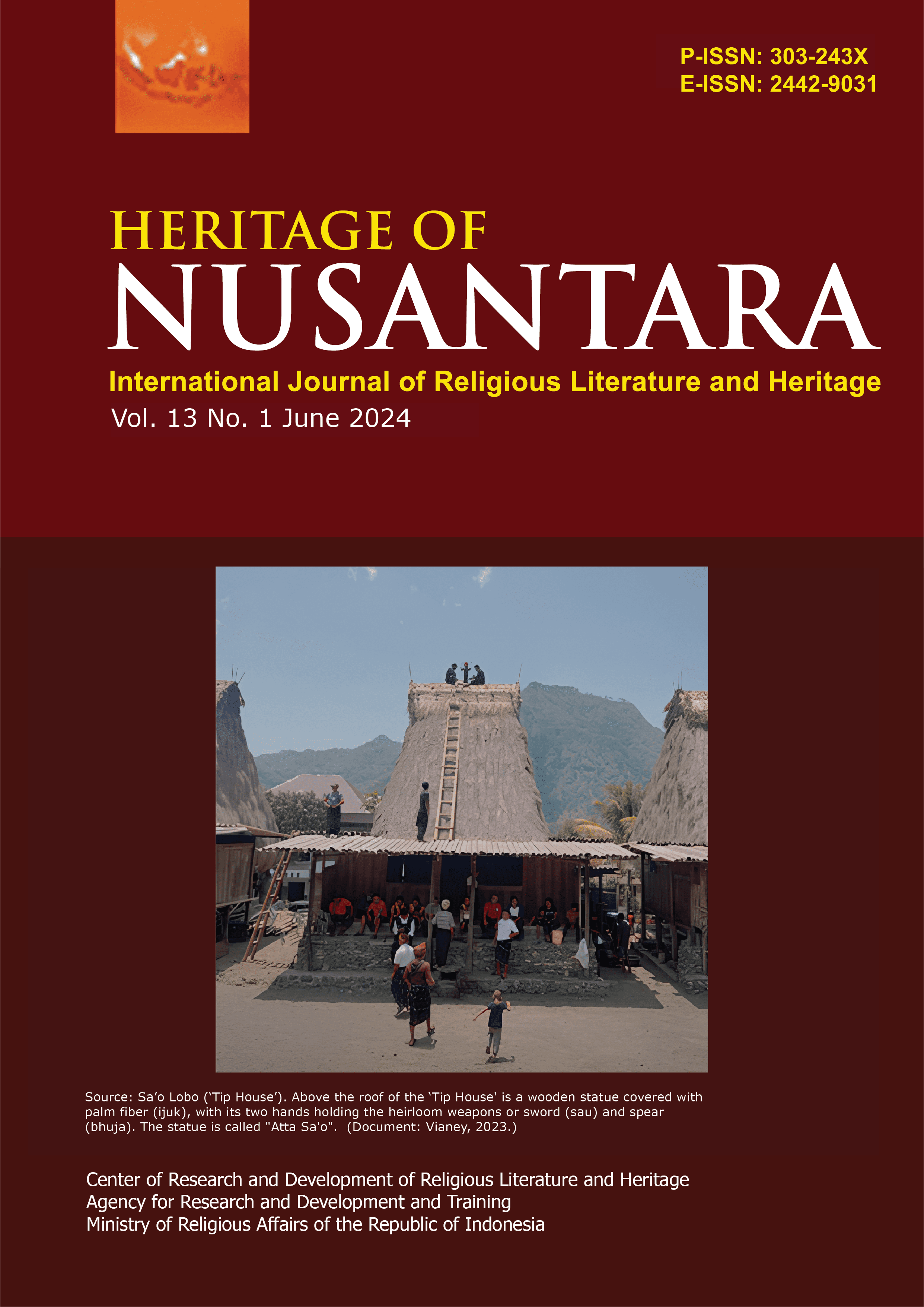The Naming System of Ngadha Houses and the Mysteries of the Trinity in Flores, Indonesia
DOI:
https://doi.org/10.31291/hn.v13i1.743Keywords:
named houses, Dewa Saga Telu, the Trinity, intercultural dialogueAbstract
This study focuses on the sa’o ngaza, or named houses, within the Ngadha heritage in Flores, Indonesia. These named houses are categorized into three types: the source house (sa’o pu’u), derived houses (sa’o dhoro) and the tip house (sa’o lobo). The central research question explores whether the inherited names of these traditional houses carry religious significance. The study employed a qualitative descriptive approach, guiding the methods of data collection, analysis and presentation. Through the lens of cultural studies, underpinned by process philosophy and process theology, a semiotic analysis of the names ‘source house’ (sa’o pu’u), derived houses for the descendants (sa’o dhoro) and the tip house (sa’o lobo) reveals meanings and values imbued with religious concepts. These concepts, related to the nature of God in local traditions, are manifested as ‘The Beginning’, ‘The End’, and ‘The Descending to be Involved’. These are referred to as the triadic beautiful names of God, or Dewa Saga Telu. The findings of this research present Dewa Saga Telu as a semina verbi of the mysteries of the Triune God (Trinity) in accordance with local traditions. Concurrently, the findings reveal the nature of one God (Dewa Sengata), who eternally exists as three distinct persons: God Beyond (Dewa Wawo), God with us (Dewa Sa’o), and God within us (Dewa Ja’o). These findings can be interpreted as a praeparatio evangelica about the mysteries of the Trinity, fostering an intercultural dialogue between Catholic doctrine and the local cultural heritage among the Ngadha people of Flores, Indonesia.
Downloads
References
Arndt, P. (1929). Die Religion der N’ada”, (part 1 & part 2) Anthropos. Wien-Mödling: Studia Instituti Anthropos.
Arndt, Paul. (1931). Die Religion der Nad’a. (West-Flores, Kleine Sunda-Inseln.). Anthropos, 26(5/6), 697–739. http://www.jstor.org/stable/40446311
Arndt, Paul. (1954). Gesellschaftliche Verhältnisse der Ngadha. Wien-Mödling: Verlag der Missionsdruckerei St. Gabriel.
Arndt, Paul. (1958). Hinduismus der Ngadha. Folklore Studies, 17(1958), 99–136. https://doi.org/10.2307/1177379
Baghi, F. (2023). Hermeneutika Tradisi Ngada, Mitos-Logos-Anthropos. Maumere: Ledalero.
Bagus, I. G. N. (2003). Guratan budaya dalam perspektif multikultural. Denpasar: Universitas Udayana. Fakultas Sastra.
Barker, C. (2006). Cultural studies : teori dan praktik. (H. Purwanto, Ed.). Yogyakarta: Kreasi Wacana.
Batarius, P., Vianey, W. Y., & Samane, I. P. A. N. (2021). Teknologi Informasi Dalam Mendokumentasikan Tutur Bahasa Ngadha Yang Mengajarkan Kode Etik Teks Lokal. Jurnal Ilmiah Matrik, 23(1), 84–93. https://doi.org/10.33557/jurnalmatrik.v23i1.1218
Cassirer, E. (1925). Sprache und Mythos : ein Beitrag zum Problem der Götternamen. Studien der Bibliothek Warburg.; 6 TA - TT -. Leipzig SE - 87 p. ; 28 cm.: Teubner. https://doi.org/LK - https://worldcat.org/title/490094825
Chang, W. (2002). Menggali Butir-Butir Keutamaan. Yogyakarta: Kanisius.
Gill, P., Stewart, K., Treasure, E., & Chadwick, B. (2008). Methods of data collection in qualitative research: Interviews and focus groups. British Dental Journal, 204(6), 291–295. https://doi.org/10.1038/bdj.2008.192
Hardawiryana, R. (penterjemah). (2000). (2000). Seri Dokumen FABC No.4: Dokumen Seputar Sinode Para Uskup Bagi Asia Tahun 1998 (Cetakan ke-1). Jakarta: Departemen Dokumentasi dan Penerangan KWI.
Hardawiryana, R. (penterjemah). (1995). Seri Dokumen FABC No.1: Dokumen Sidang-sidang Federasi Konferensi-konferensi Para Uskup Asia 1970-1991 (Cetakan ke-1). Jakarta: Departemen Dokumentasi dan Penerangan KWI.
Hardawiryana, R. (penterjemah). (1998). Seri Dokumen FABC No.3: Dokumen Sidang-sidang Federasi Konferensi-konferensi Para Uskup Se-Asia 1995-1998 (Volume 1) (Cetakan ke-1). Jakarta: Departemen Dokumentasi dan Penerangan KWI.
Kirchberger, G. (2007). Allah Menggugat. Maumere: Ledalero.
Kleden, I. (2006). Cultural Studies dan Masalah Kebudayaan di Indonesia. In Seminar Nasional, Hari Ulang Tahun X Program Studi Kajian Budaya Universitas Udayana. Denpasar: Universitas Udayana.
Kleden, I. (2007). Puisi dan Dekonstruksi: Perihal Sutardji Calzoum Bachry.
Molnar, A. K. (2000). Grandchildren of the ga’e Ancestors social organization and cosmology among the Hoga Sara of Flores. Leiden: KITLV Press.
Muda, H. (1986). The Supreme Being of The Ngadha People in Flores (Indonesia): Its Transcendence and Immanence. Roma: Typis Pontificiae Universitatis Gregorianae.
Noerhadi, T. H. (1999). “Dramatik Dalam Linguistik”, dalam Henri Chambert- Loir dan Hasan Muarif Ambary, (ed), Panggung Sejarah: Persembahan Kepada Prof.Dr. Denys Lombard. Jakarta: Yayasan Obor Indonesia.
Smedal, O. H. (2000). Sociality on Display: The Aesthetics of Ngadha Houses. Res: Anthropology and aesthetics, 37(circa 1900), 106–126. https://doi.org/10.1086/resv37n1ms20167496
Sudarminta, J. (1991). Filsafat Proses – Sebuah Pengantar Sistematik Filsafat Alfred North Whitehead. Yogyakarta: Kanisius.
Sutrisno, M., & Putranto, H. (2005). Teori-Teori Kebudayaan. Yogyakarta: Kanisius.
Tan, J. Y. (1999). Towards Asian Liturgical Inculturation, 1–60.
Titib, I. M. (1996). Veda Sabda Suci (Pedoman Praktis Kehidupan). Surabaya: Paramita.
Tuggy, D. (2017). What is the Trinity . Thinking About the Father, Son, and Holy Spirit. New York: Create Space Indipendet Publishing Platform.
Tule, P. (2004). Longing for the House of God, Dwelling in the House of the Ancestors (Chapter One Introduction).
Vianey, W. Y. (2008). Representasi Citraan Ilahi dan Insani dalam Entitas Ritus Sa’o Ngaza di Guru Sina, Kabupaten Ngada. Flores, NTT. Denpasar: Universitas Udayana.
Vianey, W. Y. (2010). Pata Dela dan Representasi Citraan Manusia Dari Etnik Ngada, Perspektif Kajian Budaya. Kupang: Gita Kasih.
Vianey, W. Y. (2016). Tuhan, Manusia, dan Sa’o Ngaza Filsafat Budaya Rumah Tradisional Orang Ngada – Flores. Yogyakarta: Kanisius.
Vianey, W. Y. (2023). The Art of Teke and Woman Ideology in the Ngada Heritage, East Nusa Tenggara. Jurnal Heritage of Nusantara, 12(2).
Whitehead, A. N. (1974). Religion in the Making. New York: New American Library.
Whitehead, A. N. (1984). Process and Reality. (D. R. G. and D. W. Sherburne, Ed.). New York: The Free Press.
Downloads
Published
Issue
Section
License
Copyright (c) 2024 Heritage of Nusantara: International Journal of Religious Literature and Heritage

This work is licensed under a Creative Commons Attribution-NonCommercial-ShareAlike 4.0 International License.






